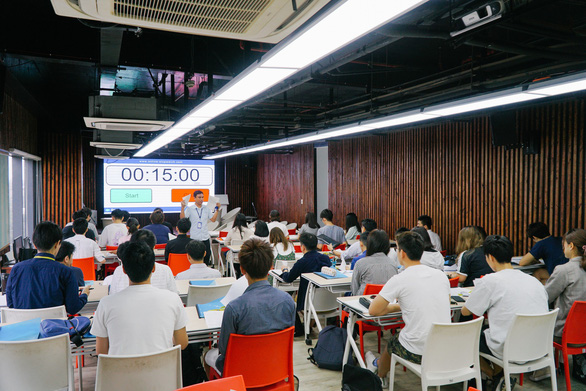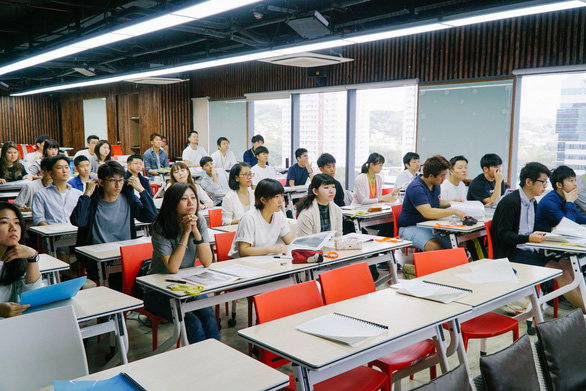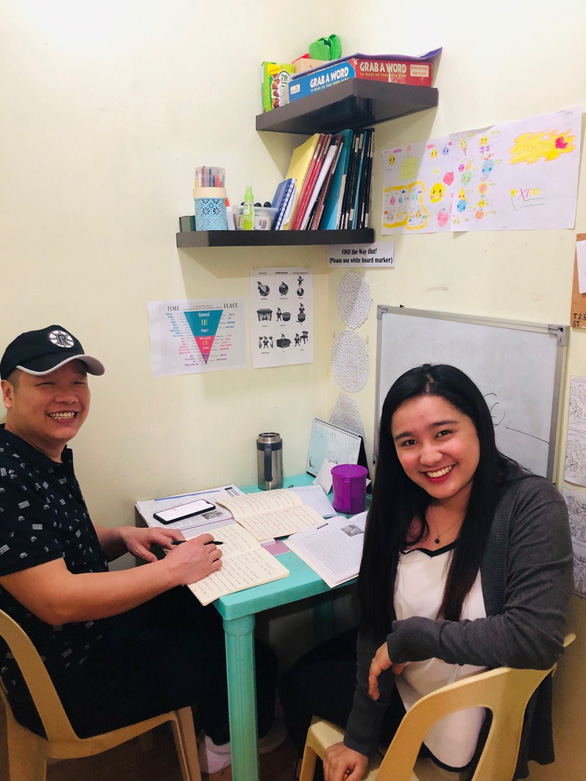TTO - Instead of going to school in the US, Australia and Singapore, many young Vietnamese choose to study English in the Philippines. Effective but cheap, especially not too far away from lifestyle and culture. How is reality?
 An English class - Photo: HUONG RUBY
An English class - Photo: HUONG RUBY
Hesitating to take a break from work to study English full-time, at the end of July I decided to go to the Philippines. I choose to study English wholeheartedly instead of stuttering English for the rest of my life.
Step into an English-speaking Asian country
Over six years ago, I got a pretty good IELTS score. However, language is a continuous process of cultivation. Due to a long break, my vocabulary, pronunciation skills and confidence in using this language have gradually diminished.
In this country, English is not a foreign language but a second language.
"People who don't go to school speak basic English. When they go to school, they know English fluently and intensively. Because in kindergarten we learned to sing in English. Primary, secondary, college and university levels all teach. in English, regardless of math, science, history, geography, literature..." - Ruffa (28 years old), my English teacher, shared.
There are about 200 schools, large and small, teaching English in the Philippines. The average cost is 1,000-1,500 USD/month depending on the course, including tuition, meals, accommodation, visa extension, local fees...
I mentally calculate with 30 million VND/month, 7 hours a day, 20 days a month, one hour of lessons with Filipino teachers is less than 150,000 VND, because 30 million VND also includes accommodation and local fees. Meanwhile, if studying in some European countries or Singapore, the fee is much higher.
I arrived at Manila airport early in the morning. After presenting the admission letter, two-way flight ticket, passport and answering the customs' question about what I do, where to go, how long to stay in the Philippines, I officially entered the journey of studying with practice.
All words and words around are in English, regardless of whether the speaker is a policeman, driver or street vendor.
From the airport, I exchanged money, bought a sim card, took a taxi to the bus station to go to Baguio city. Filipino English schools are concentrated in Baguio and Cebu. From Manila to Cebu by plane, to Baguio, you can take a bus.
Taking a taxi in Manila must be careful because many drivers cheat, taking money 4-5 times higher than reality. Students can ask the police or security guards at the airport to pick up a taxi. In addition, the Association of English Schools in Baguio (BESA) supports to transport students from Manila to Baguio at a relatively low cost.
Thanks to the school's guidance and support, I quickly went to the bus station near the airport to buy a ticket about 380,000 VND to Baguio. After eight hours, I arrived at school in the pouring rain.
 An English test - Photo: HUONG RUBY
An English test - Photo: HUONG RUBY
As soon as I arrived at school, I was taken by the Vietnamese student manager to check in and order furniture.
Next, I filled in the available form, including personal information such as Vietnamese name, English, phone number in the Philippines, phone number of relatives in Vietnam, health status and medical history (if any), your own expectations after finishing the course, the skills you want to improve...
After finishing, I went to the large classroom to take the test of listening, reading and writing skills with many other new students and then went to the American vice-principal's room to test my speaking skills. Within two hours, I had my current level results and was given the appropriate textbook.
The study programs in the Philippines are very diverse such as IELTS, TOEIC, ESL, TESOL, Working Holiday... I chose to take a course to improve ESL communication skills.
At the end of the test, my manager took me to the nearest supermarket to buy necessary items. Supporting students, each school has a manager who is Vietnamese, Korean, Japanese, Taiwanese... Evening I had my first party with classmates from many countries studying at the school.
Studying from morning to night
At 6:30 am on Monday morning, I and my friends in the room got up for breakfast from 7:00-7:50. After eating, I brought my pen and paper to the ground floor to enter the warm-up listening session.
The ground floor is for intermediate and advanced students. The third floor is for beginners. At exactly 8:00 a.m., Antony (the trainee manager, Korean) turned on the phone, a short recording was played back and forth 10 times continuously. I had to record everything I heard. Then Antony handed out the answers and I counted the number of words I misspelled, inaudible, to report back.
After completing the listening lesson, we returned to the document preparation room. At 8:30 a.m., the first class begins. One day I have seven main classes. From 8:30 a.m. to 10:20 a.m. I studied with my first teacher for reading comprehension. I have a group class with two Japanese friends and two Taiwanese friends at 10:30-12:20.
After school, we took a lunch break. 13:20 continue learning to 15:20 speaking skills. After that, I had a break for almost an hour and learned again from 16h20-17h20 listening skills.
After the main lesson, we have two more elective classes, completely free, starting from 17:30 to 18:30 and from 18:30 to 19:30. A class with a Filipino teacher and a class with an American teacher.
 Class 1:1, one teacher - one student
Class 1:1, one teacher - one student -
Photo: HENRY
We are taught according to the 1:1 model, ie one teacher with one student. So on the first day, I was corrected for pronunciation, supplemented with vocabulary and learned many skills carefully. In particular, students have the right to change or keep teachers.
At the end of seven main lessons, two elective periods, we have an extra hour to review vocabulary according to the school books. 20:00 on the ground floor, Aiden (the trainee manager, Korean) plays the tape. 90 words are played, each word repeated twice. We write and do the test, and report back the results like in the morning.
At night, the school's 1:1 classrooms turn into self-study rooms. Therefore, no one told anyone, each person actively went up to each small room to self-study until 23:00. As for me, after checking my vocabulary, I usually take a shower before continuing to study. But many of you study one circuit from morning to night.
Just learn, everything else is taken care of
From Monday to Friday, we spend all our time studying and learning. As for accommodation, the school took care of it. To save money and communicate more, I chose to stay in a quadruple room with a bunk bed with a Korean and two Japanese friends.
Although the cost is low, the school still equips the bedrooms with new beds, wooden floors, refrigerators, and full water heaters. The staff cleans the room three times a week. Blankets and mattresses are changed when requested by students.
With a lot of money, many students can choose a school by the sea, with a swimming pool, movie theater, football field, gym, yoga, zumba, dance, coffee shop on campus. Some schools also rent or build villas and resorts for students to live and study in.
Regarding food, depending on the cost, the portion of the meal is different. Some schools serve rations, some schools serve buffets. Regardless of the cost, they always change the menu, sometimes adding Vietnamese, Japanese, Korean dishes...
Not only Asians like Vietnam, Japan, Korea, Thailand, China but even French and Russian people also visit this island country to study.




